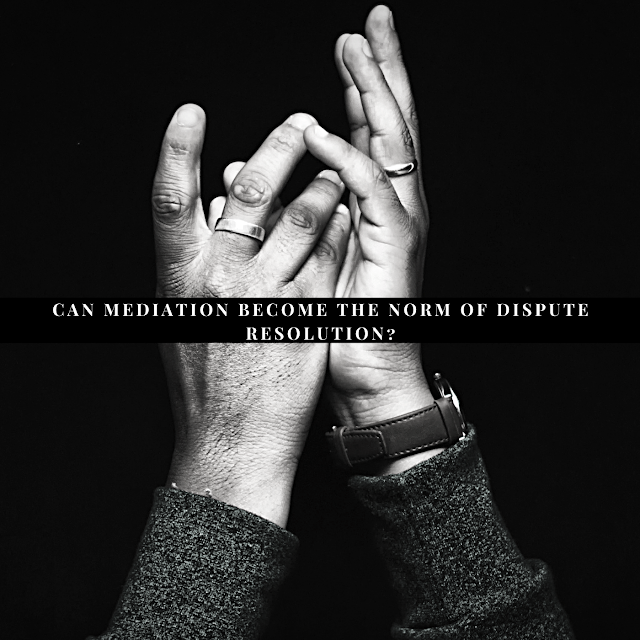CAN MEDIATION BECOME THE NORM OF DISPUTE RESOLUTION? (Content writing (Legal/Analytical/Journalistic)
BRIEF PREAMBLE & INTRODUCTION
Mediation,
an alternative dispute resolution, involves two or more individuals, groups,
businesses or organizations who have had a disagreement and unable to resolve
the issues between them. The disputants will meet with an independent/neutral
third party who facilitates discussions, encouraging them to reach an
agreement.
This
article proposes this: while acknowledging the possible limitations, mediation still
has an important role to play as a tool in dispute resolution. This article
seeks to asses; in the current epoch can mediation become the norm of dispute
resolution?
BODY
This
article is categorised into PART (1),
(2) and (3):
PART (1): Mechanism of mediations
a. Characteristics
Characteristics
of mediation can be adequately understood by looking at the advantage that
mediation entails[1]:
1. Flexible
process
2. Quicker
than litigation.
3. Cost
effective.
4. Can
be arranged quickly.
5. Can
take place with the assistances of a neutral third party.
6. Confidential
and private process.
7. Avoids
adverse precedents set by court.
8. Avoids
stress and trauma of litigants.
9. Preserve
relationship between parties.
10. More
creative solutions.
11. Understand
and narrow issues.
b. Purpose of mediation
The
purpose of mediation is to of course resolve disputes; an alternative to
litigation to meet the needs of individual litigants. It is a common practice
to treat legal action as the natural choice when a dispute arises; it can also
serve as a fallback plan for any unsuccessful mediation or negotiation[2]. Mediation
is suitable for contract disputes, consumer claims, neighbourhood disputes,
housing disputes, tortuous claims, regulatory and public sector disputes and
family disputes[3]
Part (2) Analysis on the Proponents for and
against mediation
a. Proponents against Settlement: 'The Anti-Settlements
and Adjudication-Romantics'
There
are cases that are not suitable for mediation in general; such limitations are[4]:
1. Fixation on 'Just' outcome
It
is said that mediation does not contribute to 'substantive justice', in the
sense that the primal aim of the process itself is to resolve the dispute
without emphasis on the forethought of upholding legal rights of both disputants[5]. This makes sense- the role of mediators is to
find a common ground and then focus both parties' mind on that common ground to
facilitate a solution that tailors to both the interests and needs of the
parties.
This
might render the whole process and outcome of mediation, to be about rigidly
extracting a settlement out of a dispute[6]
(without regards of the possible advantages of litigation).
2. Quality of mediator or the
mediation process
It
is pivotal for the mediation process to be utilised by both parties in
expressing their feelings and interests[7]; instances
where the process was not conducted as such, will further aggravate the
dispute.
3. Power imbalance
The
positional difference between both parties is potentially detrimental towards
the process and the eventual outcome of mediation[8].
For example, parties who enjoys financial or community standings will have the
better voice. It is equally pivotal to note that the role of a mediator is to
facilitate a settlement without the forethought of its justness[9].
4. Access to justice
As
aforementioned, the less powerful position of a party in the dispute is a
hindrance- to forcefully impose it upon the parties would mean encroaching into
the 'right of the parties on their right of access to court'[10]
Professor
Dame Hazel Genn mentioned that, "[the] outcome in mediation is not about
just settlement, it is just about settlement."[11]
In her Hamlyn Lecture, mentioned of her three concerns: firstly, mediation will
have higher success rate when the process is entered voluntarily. Second,
litigation is still the necessary avenue. Thirdly, that mediation had been set
up in opposition to adjudication and
promoting it through anti-adjudication and anti-law discourse.
To
crystallize this, she recognizes the significance of mediation as a voluntary
process and venue for parties in disputes. She felt strongly that ADR can only
play a peripheral role beside the judiciary.
However the current legal climate suggests that ADR had been misused to
stubbornly reach a solution of a dispute in contrary to the pro-adjudication
discourse, meaning to conjure up a settlement regardless of the absence of
rationality[12].
Judith
Resnik view adjudication as tool for the public to balance power with the
ruling government[13]. For
Resnik and Curtis, the court is a place where powers are redistributed amongst
parties regardless of hierarchy or other social factors. The court seems to be a
balancer, in which both parties will be obliged to exchange information and be
asked to treat opponents fairly[14]. A critical social practice that resolves
disputes, defines and refines the law, reinforces important public values and
is itself a defining democratic ritual that works the law 'pure'[15]. This
would be deemed a democratic practice- refining and bettering the existing
legal framework.
Owen
Fiss stated that ADR[16] trivializes
the value of lawsuits and reduces the social function of adjudication. He
mentioned that the court's duty extend beyond proving who is right or wrong.
The public had conferred upon the judge the duty to advance the spirit of the
law itself[17].
He
commented that the fewer judicial pronouncements of law and judicial
application of law to facts were direct results of the rise of settlement,
unaccompanied by procedural change that would provide for robust pre-trial
judicial assessment of the merits of claims. What followed was the diminishing
of public confidence in public institutions which inherently stymie the
development of public law[18].
Utilizing what Resnik, Curtis and Luban have mentioned early in their premise[19], the
hampering of the growth of the law would be against democratic values and
practices.
b. Proponents for Settlement: 'The Anti-adjudication and
Anti-litigation;
There
are obvious attractions to the use of mediation[20]:
Shift of focus:
The
involvement of a mediator shifts the mindset of the parties into settlement
mode. This can help parties to overcome impasses and deadlocks as it invites
the parties to shift to a different position which is to seek settlement
instead of insisting on the strength of their own position.
Flexibility:
Mediation
provides flexible timing and location for parties to choose from. It has also
given the autonomy of the parties in the format or formality of how the
sessions are to be conducted.
Overcoming psychological barriers:
The
role of mediation in overcoming psychological barriers should not be
underestimated. Due its flexible and non-adversarial nature, parties are
likelier to reach a settlement.
Creative, partial solutions:
Mediation
offers a plethora of solutions that is not provided under the litigation such
as letter of apology, declaration of interest, monetary settlement and other
variety of solution that can meet the need and interest of the parties.
Having
in mind of the above factors, Carrie Menkel-Meadow suggested that mediation is
akin to an ideology and a practice. Menkel-Meadow suggests that not all cases
are binary in nature and that the occasionally the usage of litigation to
resolve dispute is akin to forcefully dividing the undividable[21].
In
another article, Menkel-Meadow mentioned about the problems that entails with
the current adversarial legal system. By citing custody cases, she propounds
that emotional entities of humans can never be 'divided sharply'[22].
Litigation lacks the remedial imagination that can fulfil each party's
interest. The postmodernist way of discovering truth and way of reaching a
conclusion suggests that truth cannot be "represented" accurately[23].
She
stated that the existence of ADR and other forms of legal process
"reflects our collective dissatisfaction, for a wide diversity of reasons,
with the traditional adversary model and our current postmodern penchant for
"many methods," when one will not suffice."[24]
Perhaps a system that is more sensitive to the particular postmodern needs of
parties and the particularities of cases should be created
Fred
Rodell commented on Jerome Frank's article echoes similar views: he explains
that the adversarial elements in advocates would significantly hamper the aim
for accurate fact finding in cases[25].
It is due to this that when it comes to oral testimonies, 'a myriad of fluid,
unreliable, distorting human factors' will disappoint the finding of the case
based on real and actual facts of the case[26].
To
echo the above sentiments, settlement rate of mediation has remained constant
since 2014, being in the cusp of 86% after using mediation.[27]
This palpably showed that mediation is indeed one of the preferred options to
settle civil disputes compared to litigation.
Part (3) Conclusion
The
discourse on whether mediation can be treated as a norm for dispute resolution
is still pulsating. This article advocates a middle approach- proponents from
both spectrums should settle to the fact that the regime of mediation and
litigation should work in a synergy at this day and age.
Proponents for litigation
should recognize that process of mediation[28],
can itself also serve as 'a democratic practice- an odd moment in which
individuals can oblige others to treat them as equals as they argue.' Instead
of viewing litigation as the only venue to achieve this purpose, it should be accepted
that mediation can serve to achieve the same. With successful cases achieved
under mediation, mediation has had gravity to stand equal with litigation as a
tool to resolve dispute. It is even safe to say; that mediation, with its
accompanying advantages and disadvantages, had grown into a democratic right at
is exercisable by the public. Instead viewing mediation as an obstacle that
stymies the growth and degrades the quality of the legal system, mediation
should be view as an apparatus, similar to a litigation process, which can add
value that fits well into the legal system of the UK. It will serve as a levelled
platform for discourse.
Proponents for mediation
should have regards with the fact that the success of a mediation session is
highly dependent on the willingness of the parties to convene and whether the
mediation can fulfil both parties' needs and interest. The draw of mediation
today has been attributed to its flexibility and plethoric nature of the
settlement that can reached- without the confines of the law, mediation is
basically a 'settlement chameleon'. Hence, it serves no purpose to push mediation
through as the only mean of resolving dispute because this will go directly
against the very notion that was advanced by mediation itself- flexibility.
An
honest assessment is needed vis-à-vis the reasons behind the general disdain
towards mediation or ADR as a whole. Drawing the contention between the rule of
law and procedural justice being the reason behind the general disdain towards
the usage of ADR, Tom R. Tyler is in the opinion that these two entities are 'neither irreconcilably at odds with ADR nor
seamlessly reconcilable with it'[29].
Tyler
had not indulged himself in the debate on the efficiency of ADR like every
other proponent did. Instead, he suggested 'that
the assessments of procedural justice by disputants in ADR systems are a
critical element in ensuring that ADR exists in harmony with rule of law values
even as ADR, by its very terms, does not produce resolutions that arise
directly from the rule of law per se'. He takes the view that disputants'
understanding of procedural justice intertwines with the meaning of rule of law[30].
In
conclusion, this article agrees with the notion that mediation can be the norm
of dispute resolution but suggest strongly against fixating on mediation alone.
The underlying notion for mediation is noble- it promotes a society of peace
and security. purging adversarial elements. The notion is definitely not an
over-optimistic and impractical one- as mediation is a the brainchild of
democracy and a fairly new creation as compared to its cousin, a mature society
is needed for mediation to be fully utilized of its potential in achieving
peace and security. This article advocates the use of mediation and litigation
concurrently and in supplement of each other for the society to develop
maturely[31]
at a steady pace, taking what Tyler had generated through his discussion
regarding the antagonism of rule of law and procedural justice[32].
Relative, continuous and significant reforms are also pivotal.[33]
(2000 words; excluding cover page and
bibliography)
BIBLIOGRAPHY
Aubrey-Johnson
K & Curtis H, Making Mediation work
for you a practical handbook (LAG Education and Trust Limited 2012) 46-47.
Blake S and others, A Practical Approach to Alternative Dispute Resolution (4th
edn, Oxford 2014) 229-230.
CEDR,
The Seventh Mediation Audit (11 May
2016) 1, 3 & 7.
Fiss
O.M, Against Settlement (1984) Yale
Law School Faculty Scholarship Series, 1082.
Genn
H and others, Twisting arms: court
referred and court linked mediation under judicial pressure, MOJ Research
Series 1/07, 2007 p iii; Justice Select Committee, 6th Report, Operation of the
Family Courts, June 2011, para 123.
Glover J.M, Disappearing
Claims and the Erosions of Substantive Law (YLJ 2015) 3052.
Menkel-Meadow
C, The Trouble with the Adversary System
in a Postmodern, Multicultural World (1996) vol. 38 Issue 1, William &
Mary Law Review 5, 6-7.
Quoted
in Luban D, Settlements
and the erosion of the public realm (1995) vol. 83, Georgetown Law Journal,
2638 (as cited in Hazel Genn, Judging Civil Justice (CUP 2010) 23).
Resnik J & Curtis D.E, Representing Justice: From Renaissance Iconography to
Twenty-First-Century Courthouses (2007) Yale Law School Faculty Scholarship
Series 139, 175
Rodell
F, Courts On Trial: Myth and Reality in
American Justice, by Jerome Frank (Fall 1949) vol 25 Issue 1 Article 13,
Indiana Law Journal 114, 119. (as stated "[To]
treat a law-suit as, above all, a fight surely can not be the best way to
discover the facts.")
Rozenberg J, 'Dame Hazel Genn warns of 'downgrading' of
civil justice' (The Law Society Gazette, 18 December 2008. https://www.lawgazette.co.uk/analysis/dame-hazel-genn-warns-of-downgrading-of-civil-justice/48739.article
accessed 29 June 2017.
Tyler
T.R, Procedural Justice and the Rule of
Law- Fostering Legitimacy in Alternative Dispute Resolution (2011) Paper
4992 Yale Law School Faculty Scholarship Series 1, 2.
[1] Susan Blake, Julie Browne & Stuart Sime, A Practical Approach to Alternative Dispute Resolution (4th
edn, Oxford 2014) 229-230.
[4] K
Aubrey-Johnson & H Curtis, Making
Mediation work for you a practical handbook (LAG Education and Trust
Limited 2012) 46-47.
[7] Hazel Genn
et al, Twisting arms: court referred and
court linked mediation under judicial pressure, MOJ Research Series 1/07,
2007 p iii & 119.
[11] Joshua
Rozenberg, 'Dame Hazel Genn warns of 'downgrading' of civil justice' (The Law
Society Gazette, 18 December 2008. https://www.lawgazette.co.uk/analysis/dame-hazel-genn-warns-of-downgrading-of-civil-justice/48739.article
accessed 29 June 2017.
[12] ibid.
[13] Judith Resnik & Dennis E. Curtis, Representing Justice: From Renaissance
Iconography to Twenty-First-Century Courthouses (2007) Yale Law School Faculty
Scholarship Series 139, 175. (as stated in1st para "Individuals have entitlements to call
governments to account, publicly, for wrongdoing. However powerful they may be
when outside courts, when private-sector and public-sector actors come into
court, they become subject to rules that oblige them to exchange information
and to treat their opponents fairly")
[15] Quoted in
D. Luban, Settlements
and the erosion of the public realm (1995) vol. 83, Georgetown Law Journal,
2638 (as
cited in Hazel Genn, Judging Civil
Justice (CUP 2010) 23).
[16] Negotiation,
mediation and arbitration.
[19] cf note
13 & 15.
[20] Susan Blake, Julie Browne & Stuart Sime, A Practical Approach to Alternative Dispute
Resolution (4th edn, Oxford 2014).
[21] C.
Menkel-Meadow, The Trouble with the
Adversary System in a Postmodern, Multicultural World (1996) vol. 38 Issue
1, William & Mary Law Review 5, 6-7.
[22] ibid 7.
[23] Menkel-Meadow
(n 21) 16.
[24] ibid 43.
[25] Fred
Rodell, Courts On Trial: Myth and Reality
in American Justice, by Jerome Frank (Fall 1949) vol 25 Issue 1 Article 13,
Indiana Law Journal 114, 119. (as stated "[To]
treat a law-suit as, above all, a fight surely can not be the best way to
discover the facts.")
[26] ibid 117.
[28] Which
involves reaching a settlement between disputing parties,
[29] Tom R.
Tyler, Procedural Justice and the Rule of
Law- Fostering Legitimacy in Alternative Dispute Resolution (2011) Paper
4992 Yale Law School Faculty Scholarship Series 1, 2.
[30] ibid. Here,
Tyler also gave his definition of the rule of law.
[31] C. Menkel-Meadow
(n 21) 42. (as stated "[a] cultural
change is required, and that is not easy to legislate.")
[33]
C. Menkel-Meadow (n 21) 43. (as stated "I do not think that any one
micro-reform or any single process will successfully supplant and replace the
adversary system. I hope, however, that the post-postmodern legal system will
give parties a greater choice in dispute resolution.")




Comments
Post a Comment